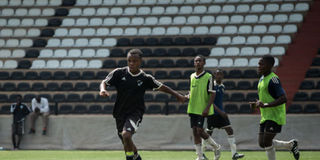‘All-powerful’ Mazembe hit by DRC political feud

Members of the Katumbi Football Academy training at the Tout-Puissant Mazembe stadium in Lubumbashi, DR Congo. The training pitches and classrooms are fit for one of Africa’s most illustrious football clubs. PHOTO BY AFP
LUBUMBASHI- The training pitches and classrooms are fit for one of Africa’s most illustrious football clubs, but the political battles rife in Democratic Republic of Congo have stopped Tout Puissant Mazembe from using their new academy.
The teenagers who are meant to be the future stars of African football are losing weight because food rations have been cut back. Lush grass is starting to grow around the buildings that owner Moise Katumbi, exiled tycoon and key opposition leader, has built on his property in Lubumbashi.
Katumbi took over Tout Puissant Mazembe – which means All-Powerful Mazembe -- in 1997 and spent millions to turn it into a continental football force. They subsequently won the African Champions League title three times -- though they also had two early wins in the 1960s.
On the political front, Katumbi, the former governor of mineral-rich Katanga province that takes in Lubumbashi, announced he would challenge President Joseph Kabila in elections due in 2016.
But the elections were delayed and Katumbi left the country the same year after being accused of harming state security. He was also subsequently sentenced in absentia to jail for real estate fraud.
The new classes and bedrooms for the Katumbi Football Academy, wholly financed by the exiled businessman, have been ready for a year, but are like a Wild West ghost town.
The club says insufficient money is trickling in to pay for operations since Katumbi went into exile in Belgium.
There has been no shortage of potential recruits for the academy since it opened in 2012 but its predicament has become increasingly dire, according to managing director Regis Laguesse.
The young players are banned from the academy football pitches for “safety” reasons and can now only use the pitch at the Tout Puissant Mazembe stadium.
“Each month, I weigh the players and for the first time in five years they have lost weight because we have been forced to reduce their food,” said Laguesse, a 67-year-old Frenchman, who has trained budding footballers from Abidjan to Bangkok.
Queuing up to join
From the Tout Puissant Mazembe stadium there is a view of the mines that powered Congo’s economic growth after the end of its devastating 1998-2003 war, until the drop in commodity prices in 2015.
The young recruits work out there in the fabled black jersey of the Mazembe team, often under a baking sun. Most have come a long way from the times when they practised in the streets or on wasteland, hoping to be noticed.
“In the neighbourhood, football is just a game with friends,” said 16-year-old academy member Magloire Nongo. “But for me, football is all my life.”
“Each time we have to filter out the men with beards who say they are only 13,” said Johan Curbilie, one of the coaches. “Or they come pressing the case for their own star, even if the kid has only one leg,” Curbilie joked.
When Mazembe play, the stadium is packed with about 18,000 people. In a recent game against CF Mounana of Gabon, the team featured Arsene Zola, 20, the first academy graduate to force his way into the first team. Twelve academy pupils have left to become professionals.
Tout Puissant Mazembe vice president, Malta David Forrest, a Belgian, says the academy players have to be encouraged despite their lack of experience. “They are a real source of wealth for the club, the province and the country,” he said.
After taking over the club, Katumbi brought in some of Africa’s best players to help Mazembe live up to its name. Some were earning tens of thousands of dollars a month, when the average salary for a Congolese player is between 100 and 200 dollars a month.
The academy players have their skills refined but must also do French and other lessons. “Our job is to educate them. We have to train their feet and their heads,” said Curbilie.
Amid the deserted buildings on Katumbi’s property, Regis Laguesse tries to remain upbeat.
“There are already a lot of the players from the second year who are better than those in the first. And now those in the third are even better,” he said, while giving orders to the gardener to cut the grass waiting to be trampled by the studs of Africa’s future football stars.




